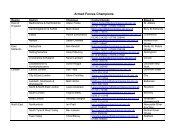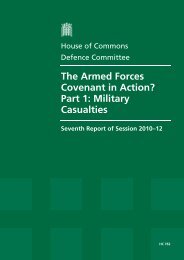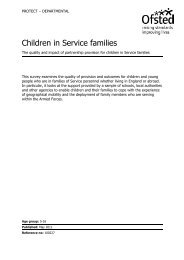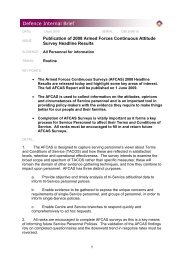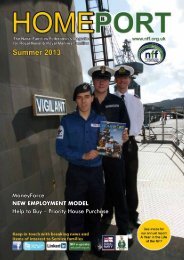Information - NFF
Information - NFF
Information - NFF
Create successful ePaper yourself
Turn your PDF publications into a flip-book with our unique Google optimized e-Paper software.
Education<br />
Directorate Children and Young People<br />
The Directorate Children and Young People (DCYP) has<br />
been recently established as the MOD lead for Service<br />
children and young people. The Directorate is headed up<br />
by Lynda Fisher (the 2-star MOD ‘Director Children and<br />
Young People’). Lynda has a wealth of experience in the<br />
wider children’s services arena and joined the MOD from<br />
Portsmouth City Council where she had held a senior post<br />
as Strategic Director. Key staff appointments within the<br />
Directorate include Safeguarding, Policy, Commissioning<br />
and Communications. The Directorate’s job is to ensure<br />
that every Service child, wherever he or she is living in the<br />
world, has the best possible opportunity to achieve their<br />
full potential and to represent Service children’s needs at<br />
the highest level across all Government Departments and<br />
Devolved Administrations.<br />
DCYP has identified key areas in Service children’s lives<br />
to concentrate on:<br />
• Dealing with upheaval caused by frequent moves of home and school<br />
• Dealing with separation due to the operational deployment of a parent or<br />
close family member or friend<br />
• Promoting and supporting healthy lifestyles<br />
• Providing inspirational and exciting learning and play activities that ensure<br />
that Service children and young people raise their expectations and achieve<br />
at the highest possible levels<br />
• Ensuring that all our children and young people are supported and<br />
protected and that they feel safe<br />
• Providing opportunities for Service children and young people to have their<br />
voices heard and have a say in shaping the services available to them<br />
• Providing access to a range of learning pathways so that our young people<br />
are able to meet the challenges of adulthood and enter the world of work.<br />
where Service children move to. Again,<br />
this is an area which DCYP is very<br />
closely focused on at the moment.<br />
Service Children in State Schools (SCISS)<br />
is a group of representatives from over<br />
800 state schools in England that serve<br />
military communities, local authorities,<br />
Department of Education, Service Children’s Education (SCE) and CEAS, and<br />
played a significant role in persuading Ministers to provide additional funds (the<br />
Service children’s Pupil Premium).<br />
DCYP recently commissioned Ofsted to look closely at the impact of the<br />
partnerships and support for Service children.<br />
The Ofsted Report (published in May 2011)<br />
recognised the strengths of the partnership<br />
working between schools and Commands<br />
overseas, SCE Pupil and Family Services,<br />
CEAS and local authorities and schools<br />
in the UK. Again, DCYP will continue<br />
to work closely with all partners in<br />
implementing the key recommendations of<br />
the Ofsted Report. The Report can be found<br />
www.nff.org.uk under Education.<br />
Please<br />
visit the DCYP<br />
website at www.mod.uk/<br />
ChildrenAndYoungPeople for<br />
further information about what we<br />
do on behalf of all Service children and<br />
young people.<br />
If anyone wishes to submit a comment<br />
or specific questions please e-mail<br />
us at:<br />
LF-PSC-CYP-Mailbox@<br />
mod.uk.<br />
The MOD commissions an annual survey known as ‘Your Say’ which is<br />
anonymous and open to all MOD staff. The responses to the 2010 survey<br />
are of particular interest to DCYP as they relate directly to some of the<br />
priority areas outlined above. For example, the survey highlighted concerns<br />
across the Services population about the upset, upheaval and sometimes<br />
emotional impact caused by frequent moves of home and school as well as<br />
separation caused by frequent operational deployments.<br />
These sorts of issues are very much on the radar of DCYP and, for example,<br />
a key priority within the Children’s Plan is supporting children during times<br />
of upheaval and change. This priority area is led by Mrs Olivia Denson who<br />
also heads up the Children’s Education Advisory Service (CEAS), which sits<br />
within DCYP and provides support, information and advice about all aspects<br />
of education for Service children, particularly when a posting, for example,<br />
necessitates changes to Service children’s educational requirements.<br />
Parents facing a move, who are concerned about the impact on their children’s<br />
education, should contact CEAS before the move for advice. CEAS produces<br />
a useful booklet entitled ‘Moving Schools’ aimed at primary school children<br />
and geared towards helping the children to think about and prepare for their<br />
forthcoming move. CEAS can be contacted on 01980 618 244 or their<br />
website at www.ceas.mod.uk<br />
Another area of concern in the Your Say survey touched on the need for<br />
better liaison between the services provided abroad and schools back in UK<br />
HOMEPORT AUTUMN 2011 37






